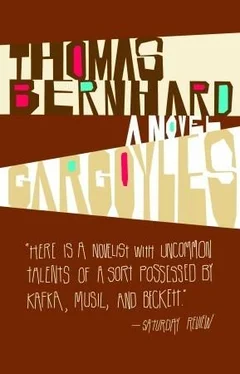When he was finished with his work—“which might possibly boil down to a single thought,” he had once said to my father — he intended to leave Hauenstein again, depart from the mountains, turn his back on them.
The simplest kind of food sufficed him, he would say. Long walks, deeper and deeper into the woods, into the impenetrable “evergreen metaphysical mathematics,” as he called the forests around Hauenstein, sufficed to keep his muscles from going slack. He was opposed to strolling and only walked in order not to “degenerate physically.”
A small iron stove warmed his room, my father said; there was a similar stove in his half-sister’s room. It was fortunate, he had once told my father, that he was diabetic, for that made it necessary for him to associate with one more person in Hauenstein beside his half-sister, namely my father. My father prevented “the perfect consistency of Hauenstein,” he had once said.
It was apparent that the industrialist rarely talked, and that when he did he was trying to fend off something that was a cruel irritation to him.
The empty rooms always had a terribly depressing effect upon my father when he considered, he said, that the person who dwelt in them had to fill them solely with his own fantasies, with fantastic objects, in order not to go out of his; mind.
The industrialist’s sole occupation, aside from writing and walking in the forest and talking with his half-sister about the provisions, was shooting at a huge wooden target fastened to two trees behind the lodge. The desire to shoot overcame him from time to time, and of late more and more. “I’m practicing, but I don’t know what for,” he once said to my father. The gunshots could be heard throughout the vicinity, my father said; sometimes they went on for hours after midnight.
He alternated between total sleeplessness and total apathy for days at a time; there was no way for him to escape from this horrible state.
On normal days the industrialist rose at half past four in the morning and worked until half past one in the afternoon. Then he would eat a bite and work on until seven in the evening.
He allowed his half-sister the “greatest possible” freedom in Hauenstein. But only six or seven weeks after they moved in he had spotted signs of insanity in her, “a madness rooted deep in clericalism.” This insanity, the industrialist thought, might recede at once if his half-sister were to leave Hauenstein. In her extreme loneliness she was always close to the point of taking her own life. But her half-brother could see that out of sheer consideration for him, for whom she did everything though she did not understand him at all, she did not even permit herself a single loud outcry, or thrashing about, which might bring her some relief. My father, for his part, could see she had the withdrawn look characteristic of women in insane asylums. Incidentally, she was obsessive about cleanliness.
“Probably her half-brother has forbidden her to talk to me,” my father said. “I always have the feeling that she would like to, but isn’t allowed to.”
He usually arrived in Hauenstein in the early morning, on the way to Prince Saurau in Hochgobernitz. “The air is purest then and the view of the Rossbach Alp at its most beautiful.”
The road we were now driving on, he commented, had been built by the industrialist at his own expense. The whole length of it belonged to him. Everywhere, hidden in the woods, the industrialist had posted unemployed millers, miners, and retired woodsmen as guards whose task was to keep people from disturbing him.
My father said he thought the industrialist could spend a while longer in Hauenstein, a few more years, perhaps. As yet my father had not detected the slightest signs of madness in the man, unlike the half-sister. But no human being could continue to exist in such total isolation without doing severe damage to his intellect and psyche. It was a well-known phenomenon, my father said, that at a crisis in their lives some people seek out a dungeon, voluntarily enter it, and devote their lives — which they regard as philosophically oriented — to some scholarly task or to some imaginative scientific obsession. They always take with them into their dungeon some creature who is attached to them. In most cases they sooner or later destroy this creature who has entered the dungeon with them, and then themselves. The process always goes slowly at first. Yet my father was not inclined to regard the industrialist as an unhappy man. On the contrary, he was leading a life that suited him perfectly, in contrast to his half-sister, who on his account was compelled to lead a totally unhappy life.
At first such persons as the industrialist’s half-sister try to defend themselves, my father said. They do not want to be wholly at the mercy of their oppressor. But they soon see that fighting back is useless. They cannot help themselves. Then they become attached to their oppressor with a despair that systematically destroys them. “The cruel despair of servitude,” my father called it.
Because they are ruthless to the core, such people as the industrialist attain their goal, even though everyone else regards the goal as senseless and the method by which it is attained repulsive.
When we arrived at the hunting lodge, I saw that it indeed stood in a clearing and the whole picture conformed to what my father had said about it.
There was not a single trophy in evidence. The place did not look like a hunting lodge at all. I thought at once: a dungeon! A provisional dungeon! All the shutters were closed, as if the lodge were uninhabited.
The industrialist’s study was at the rear, my father said. The man never allowed himself more than a single open shutter.
Everything in the place had to further the industrialist’s concentration on his work.
We got out, and since my father was expected and our car must have been heard, the door was opened at once. The industrialist’s half-sister led us quickly into the vestibule, and it struck me that originally the place could not have been a hunting lodge, for there would not have been a vestibule in such a lodge, not in our district. Probably the building had once served some function in the Saurau system of fortifications. There was not a single movable object in the vestibule, aside from a heavy cord that hung from the ceiling. The purpose of this cord perplexed me.
My father said I was his son. The industrialist’s half-sister did not shake hands with me, however. She slipped away, leaving us alone in the vestibule. I was struck by how quickly she had bolted the front door again as soon as we had entered, thrusting a heavy wooden bar into a slot. Accustomed to my father’s visits, she did not apologize before she disappeared.
I followed my father through several rooms that received some faint light through the leaves of the shutters. The walls were whitewashed, the floors larch planks. We had to go upstairs to the second floor. There was a long corridor, just as dark, determinedly darkened. I thought of the interior of a monastery.
We walked cautiously, but nevertheless made far too much noise because the rooms were empty.
I wished I could scream at the top of my voice, and as I screamed wrench open the shutters. But reason checked me.
At the industrialist’s door my father stopped, knocked, and entered without me when the industrialist called. I waited outside as we had agreed.
For a long time I heard nothing, then words (but could make out little of the context), finally a clear reference to the industrialist’s literary work. He had made enormous progress during the past week, he said, and expected to go on making enormous progress. “Even though I have destroyed everything I have written up to now,” he said, “I have still made enormous progress.”
Читать дальше












